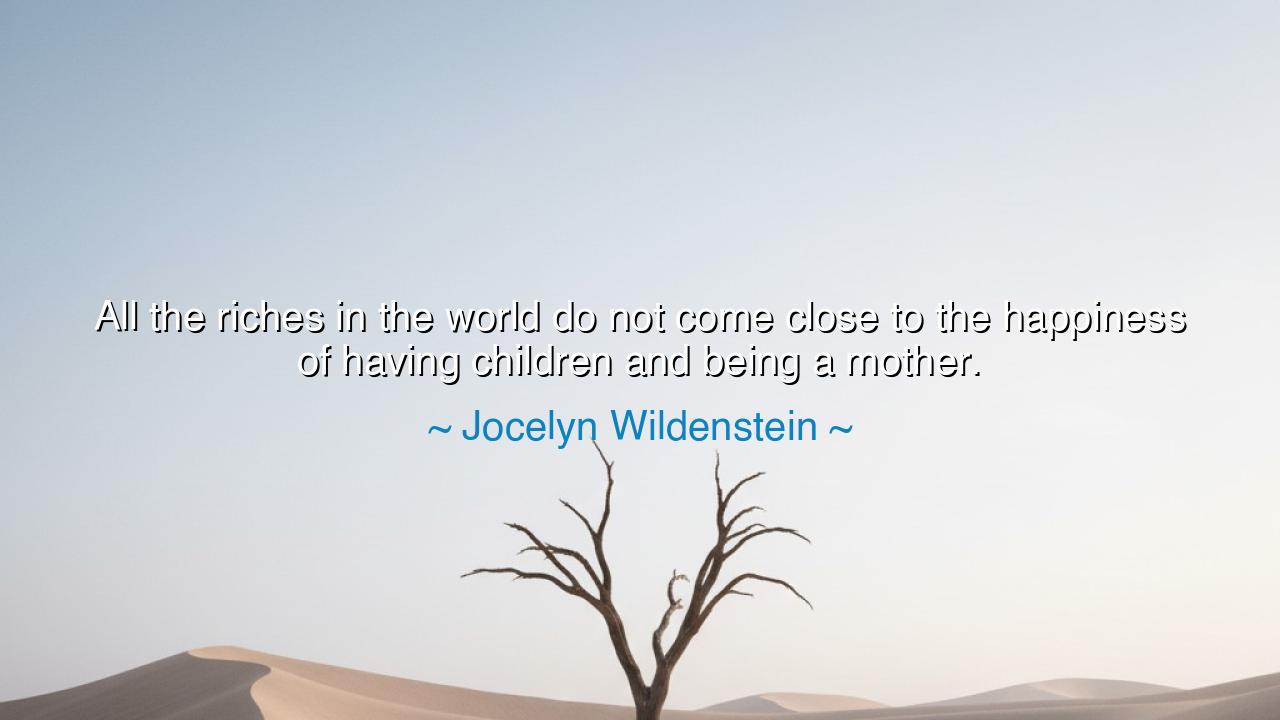
All the riches in the world do not come close to the happiness of
All the riches in the world do not come close to the happiness of having children and being a mother.






“All the riches in the world do not come close to the happiness of having children and being a mother.” Thus spoke Jocelyn Wildenstein, a woman whose life once revolved around wealth, splendor, and the opulence of worldly possessions. Yet from her lips came a truth older than gold—a truth whispered by countless generations of mothers before her: that the treasure of motherhood surpasses all earthly fortune. For no crown, no jewel, no empire can match the radiant joy of a heart that has given life, nurtured it, and watched it grow under the light of love.
The meaning of this saying reaches far beyond the individual. It is a reflection of one of the oldest laws of the human soul—that love, not wealth, is the truest measure of abundance. The ancients knew this well. They saw that riches are fleeting as dust, but the bond between mother and child endures beyond time and death. A mother’s joy is woven not from silk or silver, but from the laughter of her child, from small hands reaching for hers, from the quiet moments when she gazes upon the life that once beat beneath her own heart.
Jocelyn Wildenstein, born into a world of privilege, became known for her life among the wealthy and powerful. Yet even she, surrounded by riches, spoke of the greater treasure she had found in motherhood. Her words reveal the awakening of a soul that has seen the limits of material glory. For what use is gold if the heart remains empty? What comfort are diamonds if they cannot laugh, or love, or call you “Mother”? Through her, the wisdom of simplicity speaks once more: that joy is not purchased but born, not owned but shared.
Consider, for a moment, the story of Marie Curie, the great scientist who unlocked the secrets of the atom. Though she won two Nobel Prizes and changed the course of human knowledge, her letters to her daughters reveal that her truest pride was not in her discoveries, but in them. “I have found in my children a happiness deeper than fame,” she wrote. Her laboratory gave her wonder, but her children gave her light. For even those who touch the stars must return home to the warmth of love.
The ancients would call this the law of the heart—that the deepest joys of life are not found in conquest or possession, but in creation and connection. A mother’s love is the closest reflection of divine love known to humankind: selfless, enduring, and unconditional. It is the love that sacrifices without complaint, that forgives without being asked, that finds beauty even in sleepless nights and weary days. In this sacred bond, woman becomes both warrior and nurturer, protector and poet of life.
Yet let not this truth belong to mothers alone. It speaks to all who love deeply—to fathers, to caretakers, to any soul that gives of itself to nurture another. The lesson is clear: the happiness we seek in riches, fame, or power will always fade, but the joy that comes from love and care endures beyond measure. When you give of yourself to raise, guide, or protect another soul, you participate in life’s most divine act—creation itself.
So, my child, remember this teaching: do not measure your worth by what you possess, but by whom you have loved and how deeply you have cared. The world may chase after riches, but true wealth is found in the laughter of those you cherish. Build not kingdoms of gold, but homes of love. Cherish your children, for they are the living jewels of your heart. And when your days grow long and quiet, it will not be your possessions that comfort you, but the memory of little hands that once held yours, and the eternal joy of knowing you gave life—and love—to another.






AAdministratorAdministrator
Welcome, honored guests. Please leave a comment, we will respond soon